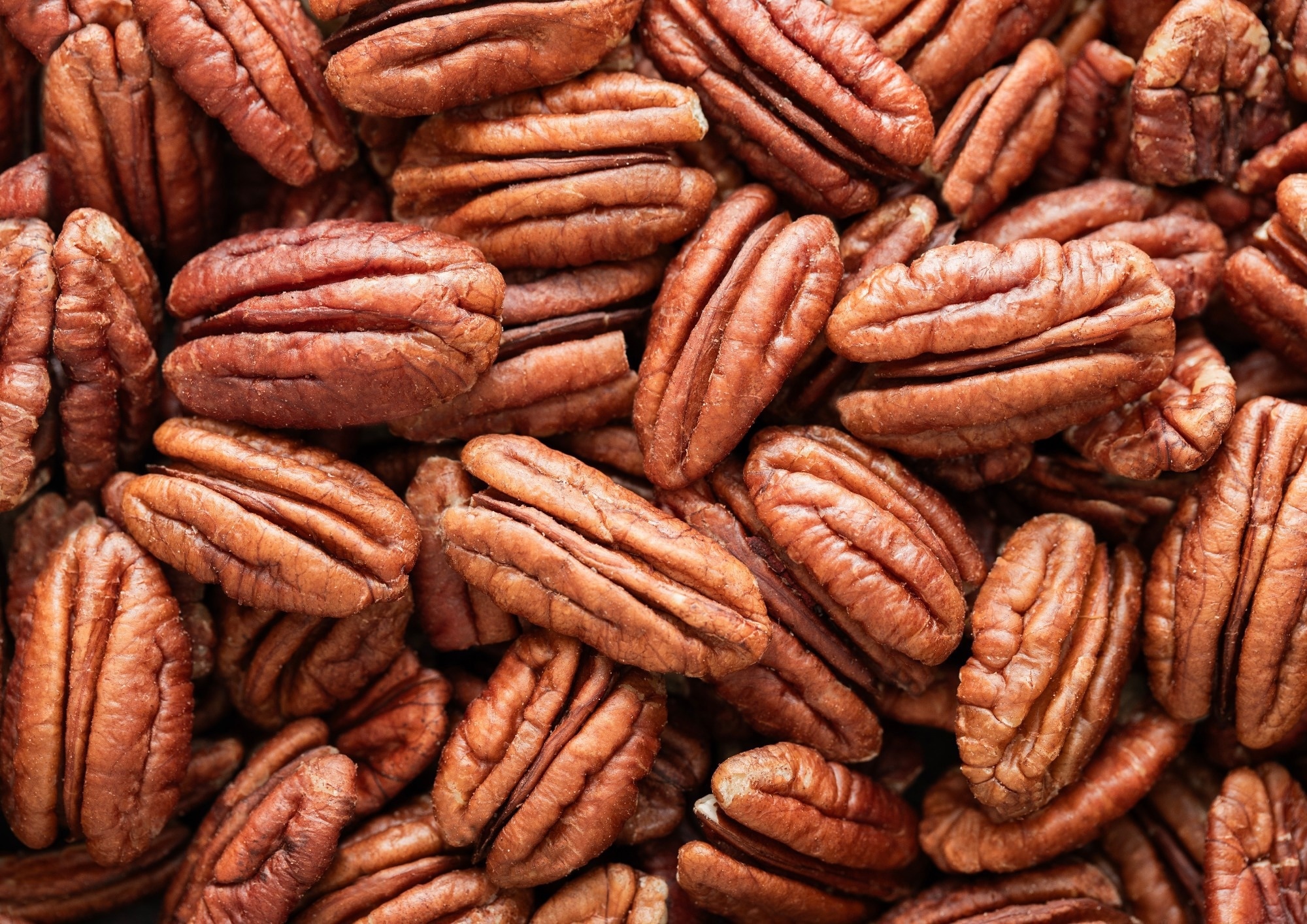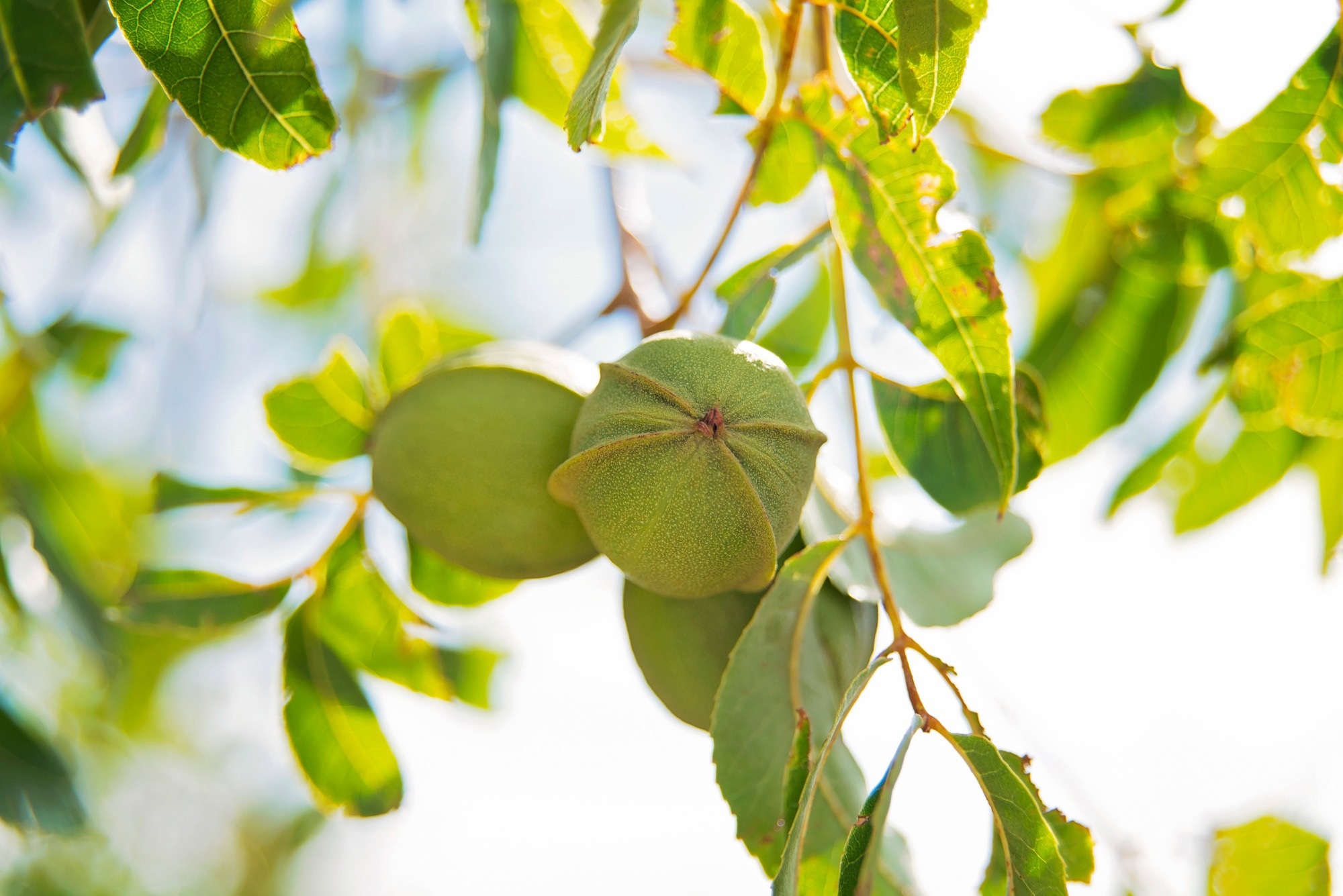Introduction
Nutritional Composition of Pecans
Cardiovascular Benefits
Impact on Glycemic Control and Metabolic Health
Cognitive and Neurological Health
Exercise Recovery and Inflammation
Weight Management and Satiety
Gut Microbiome Modulation
Contraindications and Safety Considerations
Conclusion and Takeaway Messages
References
 Image Credit: DenisMArt / Shutterstock.com
Image Credit: DenisMArt / Shutterstock.com
Introduction
Rich in unsaturated fats and packed with bioactive compounds, pecans are gaining attention in clinical research, not just for their flavor, but for their role in preventing chronic disease. Pecans or Carya illinoinensis are a type of tree nut native to North America and have been cultivated and consumed for centuries, particularly in the southern United States and Mexico.1
Although pecans are known for their rich, buttery flavor and versatility in various dishes, including pies and confections, emerging evidence suggests that they are more than a culinary indulgence. In fact, pecans are a nutrient-dense food with demonstrated health benefits and, as a result, are increasingly being explored for their role in clinical nutrition, particularly in the prevention and management of chronic diseases.2–4
With a growing emphasis on whole foods in disease prevention, understanding the clinical implications of pecan intake is relevant for the general population, as well as athletes and healthcare professionals seeking evidence-based dietary interventions.
 A pecan tree orchard in southeastern Georgia, USA. Image Credit: Gestalt Imagery / Shutterstock
A pecan tree orchard in southeastern Georgia, USA. Image Credit: Gestalt Imagery / Shutterstock
Nutritional Composition of Pecans
Pecans are rich in heart-healthy monounsaturated fats (MUFAs) and polyunsaturated fats (PUFAs), which comprise over 70% of their total fat content.2 Pecans are also an excellent source of plant-based protein, dietary fiber, essential vitamins such as thiamin (B1) and tocopherols (vitamin E), as well as minerals including magnesium and zinc.3,5
In addition to macronutrients and micronutrients, pecans are abundant in bioactive compounds such as flavonoids, ellagic acid, and phytosterols, which have been associated with anti-inflammatory, antioxidant, and lipid-lowering properties.1,3 These attributes make pecans compatible with dietary patterns emphasizing cardiovascular and metabolic health, such as the Mediterranean diet.2,3
Cardiovascular Benefits
Pecans have been extensively studied for their cardioprotective effects, particularly in improving lipid profiles and reducing inflammation. One randomized controlled trial reported that individuals who consumed a pecan-rich diet for four weeks experienced significant reductions in low-density lipoprotein cholesterol (LDL-C) levels while maintaining high-density lipoprotein cholesterol (HDL-C) levels.4
The mechanisms underlying these effects are likely linked to the high content of unsaturated fats and phytosterols, which inhibit intestinal cholesterol absorption.2 Pecans have been shown to enhance endothelial function, a key factor in cardiovascular health. Additionally, improvements in flow-mediated dilation and reductions in markers of oxidative stress have also been observed, further supporting their inclusion in heart-healthy diets.2
 Pecan nuts. Image Credit: Kayla Blundell / Shutterstock
Pecan nuts. Image Credit: Kayla Blundell / Shutterstock
Impact on Glycemic Control and Metabolic Health
Pecans may moderate glycemic response and improve insulin sensitivity, particularly in individuals at risk for type 2 diabetes. Previously, a controlled feeding trial reported that participants consuming 42 grams of pecans daily exhibited improved insulin sensitivity and reductions in fasting insulin levels over four weeks.1
The fiber and unsaturated fat content in pecans slows gastric emptying and reduces postprandial glucose spikes, which can benefit prediabetic individuals or those with metabolic syndrome. Previous studies have reported that pecans led to a lower glycemic load without impairing glucose homeostasis, thus supporting their safe inclusion in diets for prediabetes management.2
Pecan consumption has also been associated with increased satiety, potentially due to their fiber and fat content. This satiety-promoting effect may reduce subsequent energy intake and improve glycemic control through appetite regulation.6
Cognitive and Neurological Health
Emerging clinical evidence suggests that nut consumption, including pecans, may have neuroprotective benefits. Higher tree nut intake has been associated with better cognitive function in older adults, particularly in domains such as memory and executive function.7
These effects are likely mediated by pecans' antioxidant and anti-inflammatory properties. Rich in vitamin E, polyphenols, and ellagic acid, pecans counteract oxidative stress and inflammation, both of which are implicated in age-related cognitive decline.8 Although specific randomized controlled trials on pecans and cognition remain limited, observational studies and mechanistic insights support their potential to promote brain health.
Exercise Recovery and Inflammation
For athletes and physically active individuals, inflammation and oxidative stress are critical concerns during recovery. Consuming pecans has been shown to reduce the levels of C-reactive protein and other inflammatory markers after exercise, thus suggesting improved recovery outcomes for athletes.3
Previous studies have also suggested that polyphenolic compounds in pecans act as antioxidants by scavenging reactive oxygen species generated during intense physical activity. The antioxidant activity of pecans can minimize muscle damage and accelerate recovery, particularly in endurance sports and resistance training contexts. The magnesium and zinc content in pecans also supports muscle function and repair.1,5
Want to find more about the latest research on pecans and health?
Weight Management and Satiety
Despite being energy-dense, pecans may support weight management when consumed in moderation. Clinical studies have reported that nut consumption is not associated with weight gain, likely due to mechanisms such as increased satiety, incomplete fat absorption, and enhanced thermogenesis.6
For example, one study involving daily pecan consumption over eight weeks did not report significant weight gain or increases in body fat percentage. Rather, these study participants reported increased fullness and satisfaction, which may contribute to better portion control and reduced caloric intake at subsequent meals.8
Gut Microbiome Modulation
The gut microbiota is increasingly recognized as a mediator of systemic health. Nut consumption has been found to increase the abundance of butyrate-producing bacteria and short-chain fatty acid (SCFA) levels, which are associated with improved metabolic and immune health.9
SCFAs like butyrate play a critical role in gut barrier integrity and anti-inflammatory signaling. By fostering a more diverse and beneficial microbial profile, pecans may contribute to the prevention of chronic diseases linked to gut dysbiosis.
Contraindications and Safety Considerations
Pecans can trigger severe reactions, including anaphylaxis, in susceptible individuals; therefore, those with known nut allergies must avoid pecans entirely.
Pecans are calorie-dense, providing approximately 200 kcal for every one ounce or 28 grams serving. For individuals managing caloric intake or weight, portion control is essential.
Individuals at risk of kidney stones should also moderate their nut consumption due to the oxalate content in nuts. Although moderate oxalate content in pecans may warrant caution, no clinical studies have directly linked pecans to kidney stone formation.
The high vitamin E content in pecans may interact with anticoagulant medications such as warfarin, potentially increasing bleeding risk. Patients on these medications should consult healthcare providers before significantly increasing pecan intake.5,11
Conclusion and Takeaway Messages
Pecans are a nutrient-rich, functional food supporting cardiovascular health, glycemic control, cognitive function, inflammation reduction, and modulation of gut microbiota. These effects make pecans a valuable dietary component in public health nutrition and athletic recovery strategies.
A moderate daily intake of 30-50 grams of pecans, which is equivalent to approximately 1-1.5 ounces, has been used effectively in clinical trials without adverse effects. However, additional long-term randomized controlled trials are needed to fully understand the potential role of pecan consumption in chronic disease prevention and health maintenance.
References
- McKay, D. L., et al. (2018). Nutrients, 10(3), 339. DOI:10.3390/nu10030339, https://www.mdpi.com/2072-6643/10/3/339
- Hart, T. L., et al. (2025). Am J Clin Nutr, 121(4), 769–778. DOI:10.1016/j.ajcnut.2025.01.024, https://www.sciencedirect.com/science/article/pii/S0002916525000577
- Delgadillo-Puga, C., et al. (2023). Nutrients, 15(11), 2591. DOI:10.3390/nu15112591, https://www.mdpi.com/2072-6643/15/11/2591
- Rajaram, S., et al. (2001). J Nutr, 131(9), 2275–2279. DOI:10.1093/jn/131.9.2275, https://www.sciencedirect.com/science/article/pii/S0022316622145566
- U.S. Department of Agriculture (2022). Accessed from: https://fdc.nal.usda.gov/food-details/2346395/nutrients
- Guarneiri, L. L., et al. (2021). J Nutr, 151(10), 3091–3101. DOI:10.1093/jn/nxab248, https://europepmc.org/article/med/34383903
- O’Brien, J., et al. (2014). J Nutr Health Aging, 18(5), 496–502. DOI:10.1007/s12603-014-0014-6, https://link.springer.com/article/10.1007/s12603-014-0014-6
- Cogan, B., et al. (2023). Clin Nutr ESPEN, 56, 25–35. DOI:10.1016/j.clnesp.2023.05.002, https://www.sciencedirect.com/science/article/abs/pii/S2405457723001262
- Holscher, H. D., et al. (2018). Nutrients, 10(2), 126. DOI:10.3390/nu10020126, https://www.mdpi.com/2072-6643/10/2/126
- Liu, R. H. (2013). J Food Sci, 78 Suppl 1, A18–A25. DOI:10.1111/1750-3841.12101, https://ift.onlinelibrary.wiley.com/doi/10.1111/1750-3841.12101
- NIH ODS. (2021). Vitamin E Fact Sheet. Accessed from: https://ods.od.nih.gov/factsheets/VitaminE-HealthProfessional/
Last Updated: May 6, 2025